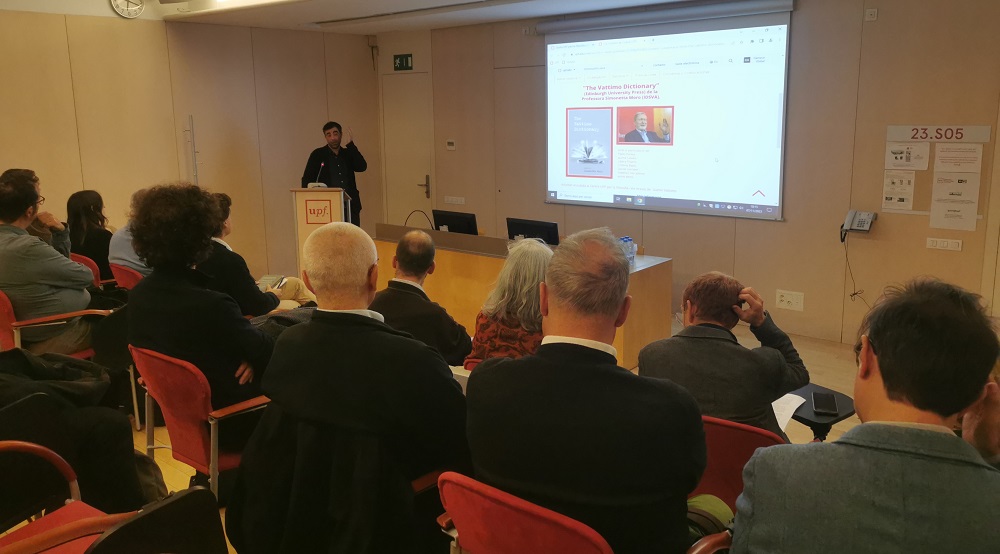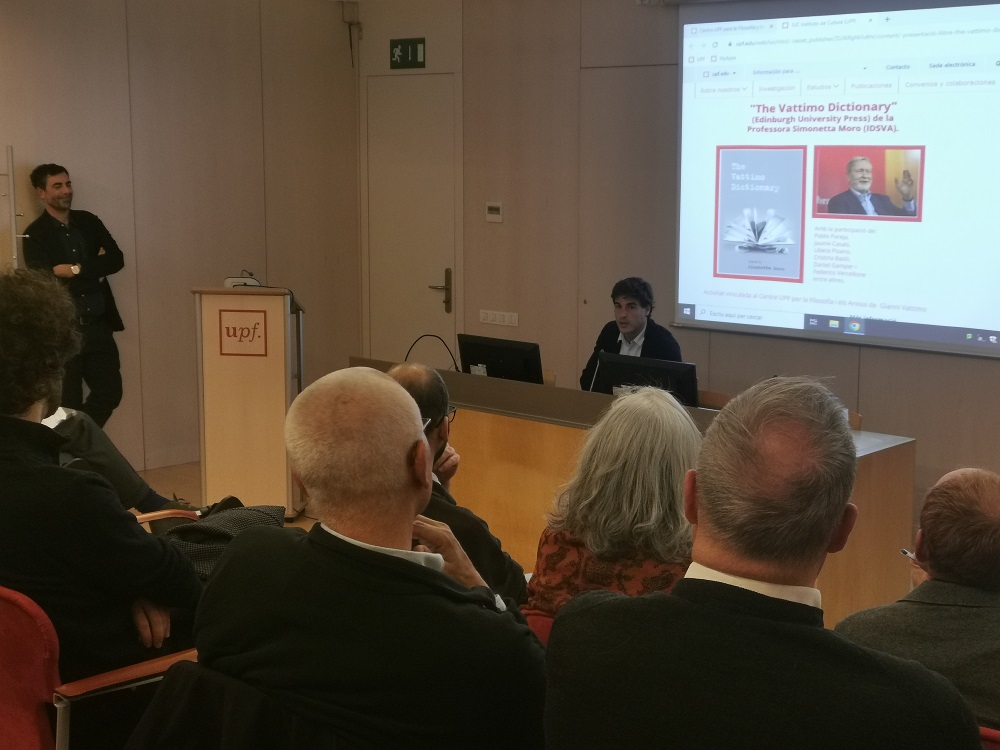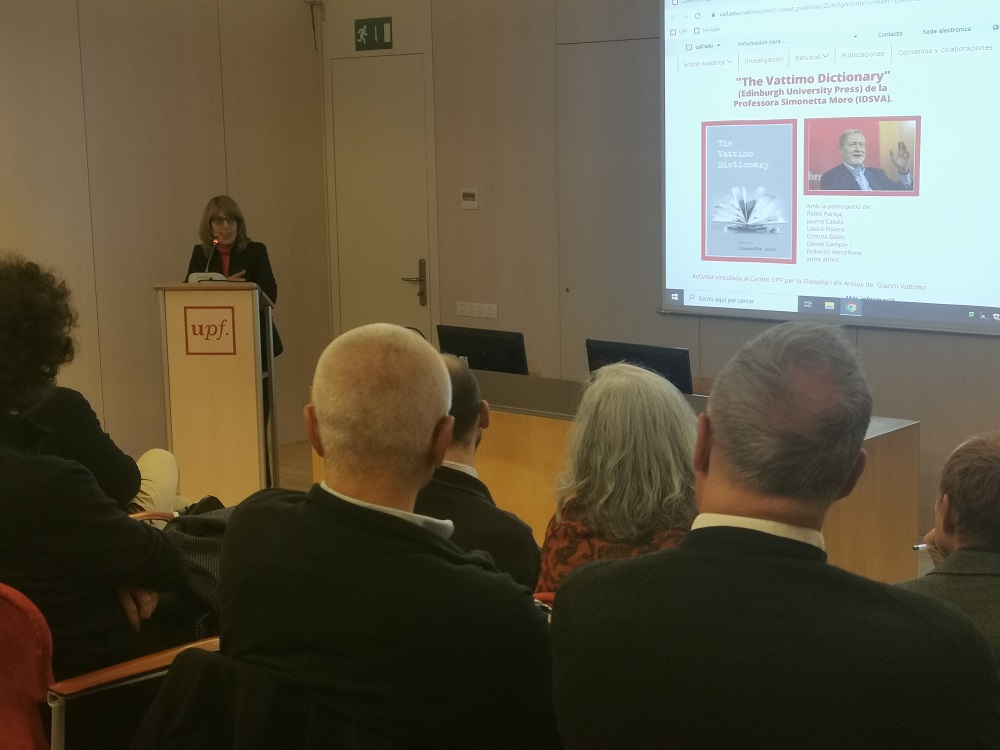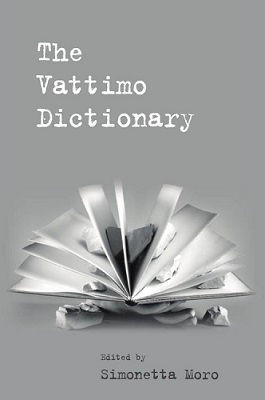UPF pays tribute to the philosopher Gianni Vattimo with the presentation of “The Vattimo Dictionary”
UPF pays tribute to the philosopher Gianni Vattimo with the presentation of “The Vattimo Dictionary”
UPF pays tribute to the philosopher Gianni Vattimo with the presentation of “The Vattimo Dictionary”
During the ceremony, which was held in the evening of 7 November on the Ciutadella campus, the first research tool to understand the concepts and debates arising from Vattimo’s philosophy was presented. Organized by the UPF Center for Vattimo’s Philosophy and Archives and the University Institute of Culture, the tribute was attended by several disciples of the Italian thinker, who passed away in September this year.

Gianni Vattimo (1936-2023), considered one of the most important contemporary philosophers of recent decades, and the creator of weak thought, donated to UPF in 2016 an extensive archive with documentation related to his academic, political and personal activity that make up the Gianni Vattimo Archive, housed in the Library.
The University, which subsequently created the UPF Center for Vattimo’s Philosophy and Archives, organized an event to pay tribute to the philosopher, who passed away in September of this year. The meeting included the presentation of The Vattimo Dictionary, a work edited by Simonetta Moro (present at the tribute), a research tool and a guide to help understand the concepts and debates arising from his philosophy.
The tribute and presentation of the work, organized by the UPF Center for Gianni Vattimo’s Philosophy and Archives and the UPF University Institute of Culture (IUC), took place in the evening of 7 November in the auditorium of the Mercè Rodoreda building on the Ciutadella campus, and was attended by several philosophers, disciples and colleagues who worked alongside Vattimo throughout his extensive career.
The ceremony was opened by Santiago Zabala, an ICREA research professor at the UPF Department of Humanities, director of the UPF Center for Gianni Vattimo’s Philosophy and Archives, a disciple of and fellow researcher with the master for several decades, who spoke about the importance of the archives housed at UPF and Vattimo’s legacy in general.
“There is no better way to honour Vattimo than by presenting a dictionary”, said Zabala at the start of his speech in which he thanked Jaume Casals, former UPF rector (“without whose help the archives would neither have been created nor come to the University”) for his hard work, and the UPF library staff, who catalogued and ordered all the documentation.
Santiago Zabala recalled that thanks to the UPF archive, Vattimo was able to write his last book (Being and Its Surroundings) and the Vattimo Dictionary was conceived, to which Simonetta Moro devoted nearly four years of hard work. The ICREA research professor stressed that, unlike the archives of other thinkers, Vattimo helped personally, from his home, to select and classify the documentation. Finally, concerning the work, he pointed out that “the Vattimo Dictionary has 53 participants, 53 voices that make it richer, from a philosophical and hermeneutic point of view”.

Pablo Pareja, vice-rector for UPF Teaching and Research Personnel and Serra Húnter associate professor of International Relations at the Department of Law, then spoke, stating that he was “happy that UPF and the Library/CRAI house the archives of Gianni Vattimo, and that at the same time they have served to create this dictionary, which gives a new meaning to this collection”.
Pablo Pareja made three reflections on the book: firstly, that the work achieves a complex milestone, since it finds a balance between the cohesion required by a dictionary and the plurality and diversity provided by the more than 50 voices it includes; secondly, that it does not have a mission to standardize, but “allows us to approach Vattimo’s work and the way of thinking of all the participants, who contribute a multifaceted vision of his work. I see the dictionary as the start of a conversation”.

Finally, the vice-rector stated that this work is an example of the University’s commitment to creating conditions for dialogue to unite the talent from outside coming to the institution: “Thank you for choosing UPF and using us as a platform from which to do different things”, he concluded.
The second part of the ceremony began with the intervention by Simonetta Moro, editor of The Vattimo Dictionary, linked to the US Institute for Doctoral Studies in the Visual Arts (IDSVA), who explained how this book was conceived and developed, the usefulness of the archives housed at UPF so that it could become a reality, and the fact that it is the result of collaboration and collective participation.
The tribute was completed with speeches by Jaume Casals, a professor of Philosophy of Law and former UPF rector, without whom the donation and creation of the archives would not have been possible, and the philosophers Cristina Basili (Complutense University of Madrid), Federico Vercellone (one of Vattimo’s first students and a professor of Aesthetics at the University of Turin) and Daniel Gamper (Autonomous University of Barcelona). Finally, Santiago Zabala closed the event.
An innovative guide to understand Vattimo’s philosophy

The Vattimo Dictionary was scheduled to be presented at UPF at the end of September, but Gianni Vattimo’s death on 19th of the same month delayed the presentation, which finally turned into an act of homage and tribute.
Although several monographs on Vattimo have already been published, this book is the first research tool to understand his philosophy, a kind of guide to the concepts and debates that have arisen surrounding his philosophy. Hence it includes cross-references so that readers can see how the systemic links work in the philosopher’s thought.
The work provides clear definitions concerning Vattimo’s work, aimed at new readers and the public in general, while offering other avenues designed for more specialized research. Entries, from A to Z, cover over 100 of Vattimo’s important concepts and topics, as well as entries for other thinkers it cites.
Prominent authors such as Eduardo Mendieta, Franca d’Agostini, Santiago Zabala, Silvia Mazzini, Carmelo Dotolo, Federico Vercellone and Robert Valgenti, among others, all include key critiques of Vattimo’s work.
